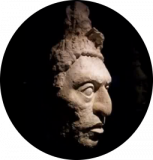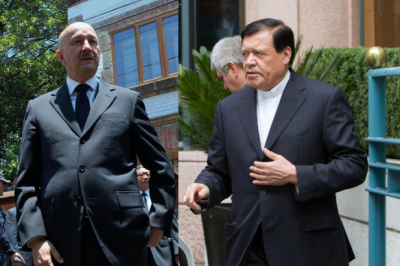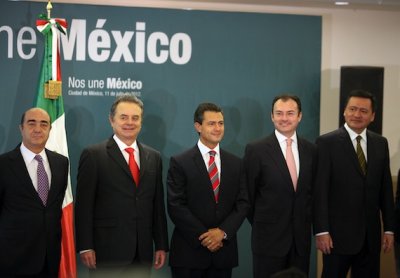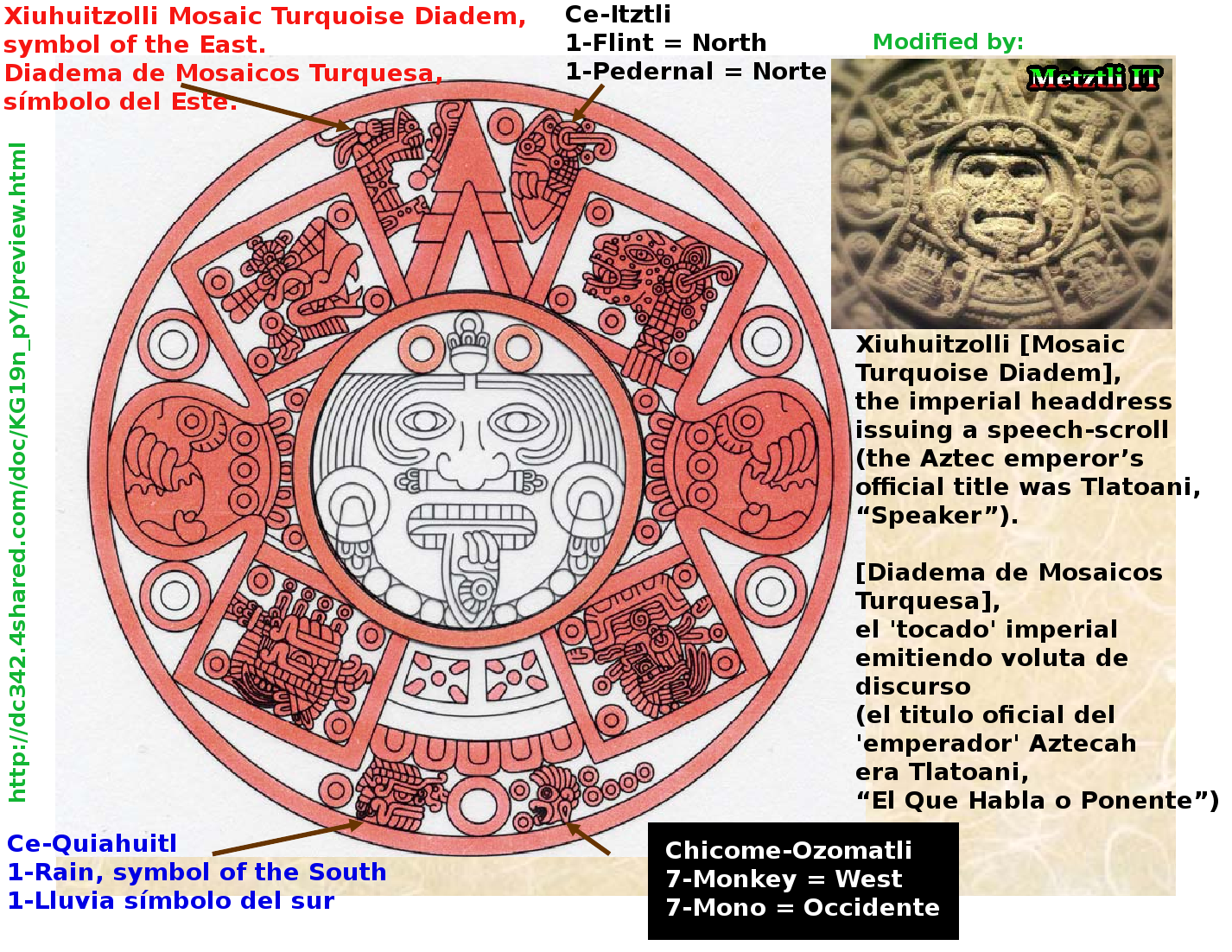Tag: "tenochtitlan"
Where Are The Real Mexicans?
By Jose on Aug 13, 2014 | In Tlalnepantla, Mexico, Ixachitlal, Tenochtitlan | Send feedback »
Totonal ye
omotlatitzino,
totonal ye omixpoliuhtzino,
ihuan centlayohuayan
otechcahuili.
Mach ticmatih occeppa mohualhuiliz,
ma occeppa moquizaltiz
ihuan yancuican techtlahuililiquiuh.
"For the big companies, Brazil has shut, given the way they did the pre-salt rules," said Ramon Espinasa, lead oil and gas specialist at the Inter-American Development Bank. "Venezuela is effectively shut, Argentina is shut. So Mexico is the new point in the Western Hemisphere." Mexico Oil Is Boon for Exxon to BP as Frontiers Teeter - Bloomberg
As the Cártel Español (i.e., Spanish Cartel) -- corrupt strain of Iberian-descended clique of plunderers -- in complicity with like-minded native descendants of various Anahuacah nations who fought alongside the plunderer and thief Spaniard Hernan(do) Cortes against the Mexicah, finish-off 'Mexico,' the question raised in the title of this post is relevant.
Under a deceptive and wealth usurping initiative led by PRI political party and openly or surreptitiously agreed upon by others like PAN, PRD, and PVE, politicians in New Spain -- this cloaked under the deceptive name of 'Mexico' -- have fraudulently legalized on August 12, 2014, a final set of laws to open 'Mexico' to the plundering by foreign capital interests at the expense of native local human life and the destruction of natural resources (in western parlance).
This is nothing more than the continuation of the European proletarianization scheme initiated in 1492, now led by the U.S. -- as most recently seen by its interventions in Central America (1980's); these have only engendered corruption, human misery, and forced unnatural migrations towards the north of the desperate, dispossessed masses, who flee the violence and genocide in Guatemala, Honduras, and El Salvador.
Thus on this day, August 13, 2014, which marks the date when some 250,000 real 'Mexicans' died defending their world's unique eponymous altepetl (i.e., metropolis) Mexico-Tenochtitlan against the genocidal Spanish thieves and plunderers allied with the Mexicah's indigenous enemies, the question arises: if those who now occupy 'Mexico' are really 'Mexicans', why did they surrender supine to the Cártel Español's latest and final rapine --essentially leaving no immediate nor long term future for 'Mexico's growth and development-- and with such pusillanimous attitude? Let's explore some history:
Cuauhtemoc Dies, killed by Hernan Cortes.0
(February 28, 1525) Valley of Anahuac. - Son of Ahuizotl and Tlillalcapatl -- sister of Cuitlahuac and Moctezuma Xocoyotzin --, his birth date uncertain: some say his birth was in 1495 while others say it was 1502. Born in Mexico-Tenochtitlan, but it appears he grew up in Ichcateuhpan and he was educated at the Calmecac; he returned to Tenochtitlan only a few years before the arrival of the Spanish invaders, and [Oquichcuauhtli, i.e., brave warrior (literally male Eagle)]1, he was a quite popular chief of Tlatelolco, where he was also supreme teuhpixqui (i.e., guardian of the divine)2 --Teteuhctin and Teuhctli -- of the Huitzilopochtli cult. During the stay of the spaniards at the Mexicah3 capital, Cuauhtemoc took part in his people's defense against the Spaniards' massacre at the Huey Teuhcalli ['Great Temple'] and at the ensuing battle that almost defeated the Iberian invaders4 and their indigenous allies, forcing them to flee the capital. He was named Mexicah Tlahtoani at the death of Cuitlahuac in March 1521, who fell victim to chickenpox infection brought by the Iberians. His Cihuatlahtoani (i.e., She who's voice should be heard, or 'queen') was Tecuichpoch, a girl of little more than 10-years-old.
Bernal Diaz del Castillo5 described him as follows: "of a quite nice disposition, body and features likewise, and his face somewhat long and cheerful and his eyes projected the impression of a grave as well as pleasing look, and there was no malice in them... and his [skin] color was akin more to white than to the color and hue of those other brown 'indians'."6 He was determined and courageous, qualities which had driven him to conquer various victories in the military field. Furthermore, he had become a symbol of the most ferocious opposition to the Spanish plunderers, and even had severely criticized Moctezuma [current Tlahtoani] for his peaceful policy towards the invaders' advance -- in fact, there is a version that asserts it was him who threw the rock that wounded Moctezuma --. Notwithstanding, Cuauhtemoc had to fight-off an overthrow attempt by one of Moctezuma's sons, who strove to become ruler and thus negotiate an alliance with the Spaniards. With those garments and without any ceremony, Cuauhtemoc was elected Tlahtoani7 in an extraordinarily difficult situation for the Mexicah.
His task as Tlahtoani was essentially a single one: the defense of his homeland from the Spanish plunderers and their [indigenous] allies. He organized his people to undertake the resistance to face the invaders; in addition, he seeked to establish alliances with other 'manors', to whom he promised not to extract tribute anymore, an enterprise in which he failed, for soon the Mexicah had to face with their own strength the Spanish plunderers [a few hundred] and their [indigenous] allies whose army numbered more than eighty thousand men.
"Cuauhtemoc fights his enemies fully aware of his impending defeat. In this intimate and unflagging acceptance of his loss exists the tragic character of his struggle. And the drama of this awareness that everything around him will collapse, and in the first instance his Teteuh 8, creators of the grandeur of his people, seems to preside our entire history".9
Cortes' forces besieged Mexico-Tenochtitlan on May 22, 1521. Cortes had his own men, arms, horses, thirteen brigantines and thousands of soldiers of the indigenous allied armies from Texcoco and Tlaxcala. The established siege was planned: At Chapultepec, Pedro de Alvarado and Cristobal de Olid, after fierce battle, broke the aqueduct that supplied water to the Mexicah city. Gonzalo de Sandoval went to Ixtapalapa aided by Cortes and his brigantines, but they were attacked by the Mexicah as they passed by the Tepopolco crag. Cortes disembarked and took over the crag. Meanwhile, some five-hundred canoes attacked the brigantines, but the wind blew against those and its action made them crash against the enemy ships.
Isolated, Cuauhtemoc received three Mexicah prisioners sent by Cortes to negotiate peace and offer him and his close collaborators privileged treatment. After listening to them, Cuauhtemoc went to Tlalocan to subject himself to the will of his people: the Mexicah decided that they would rather die than to be enslaved by the Spaniards. From then on the thought of making deals with the Spaniards was vanished; they organized the defense of Mexico-Tenochtitlan, they ordered out those who could not help out in the war and provisioned a great amount of food supplies and weapons; they ordered any and all who could throw a rock or a spear and to wield a baton, be a man, woman or child to defend Huey10 Tenochtitlan. It is told that in a certain occasion, Cuauhtemoc ordered that women be dressed in military attire and march forward in an effort to make the invaders believe that he had more warriors than he had in reality.
A chronicler attributes to Cuauhtemoc the following extraordinary words: "Gallant Mexicah: You have seen how our vassals all have rebelled against us, now we have as enemies not only the Tlaxcaltecah and Cholultecah and Huexozincah, but the Tetzcucah and Chalcah and Xochimilcah Tepenacah as well, all of whom have deserted and abandoned us and have gone and joined the plunderers and now come against us. Hence I pray you to keep in your mind the gallant heart and courage of the Chichimecah Mexicah, our ancestors, who being so few to come into this land, they ventured to undertake and go amongst millions of people and thus held with their powerful arm all this new world and all the nations --not leaving shores nor far away provinces unruled or not gripped by them-- and placed their life and industry at the board, merely to augment and extol their name and courage."
To prevent the brigantines from approaching Mexico-Tenochtitlan, the Mexicah placed huge stakes below the water which blocked the advance of the vessels and they also dug trenches on the roadways to prevent advancement over land. Against their own indigenous custom, Cuauhtemoc undertook night battles which perplexed the Spaniards. It was a relentless struggle, but whereas the indigenous were killed, the Spaniards were made prisoners to sacrifice them afterwards. Gradually Cortes closed the siege and ordered a general attack, again he was repealed and beaten; besides, he ran out of gunpowder and shot, casually however a vessel arrived at Veracruz which provisioned him.
At first the Mexicah incinerated their dead; afterwards, the intensity of the battle prevented them from doing so. According to the chronicles, the dead bodies upholstered the surface of their city and the smell was unbearable. While in continuous battle, the Mexicah took refuge in the last indigenous stronghold: Tlatelolco.
Orozco and Berra tell us: "The Tenochcah defense of the city is an amazing event worthy of being placed as paragon with Jerusalem's, with that of Sagunto and Numantia, with that of Zaragoza. The warriors, almost naked, with weak weapons, left to their own strength, battled against men wrapped in iron, immune against iron and fire, backed by innumerable allies. Almost always defeated, they returned to the fight without ever losing courage, though the Mexicah were convinced that a certain death awaited them -- which they preferred to that of losing their freedom. Having finished their food supplies, they ate the water vermin, the insects of the soil, the herbs, the leaves and the barks of the trees, they dug into the soil to bring out roots. The unburied bodies filled the pits, blocked the streets, filled the houses; the rottenness poisoned the air and the dreadful plague overcame all. The buildings were razed to the ground, they battled over the rubble, taking cover then on whatever structure remained standing; sold by their friends, abandoned by their allies, placed before their traitor vassals' open insurrection, they faced-off against all, as well as the white bearded men, and the gods to whom the ancient prophet gave the dominion of the earth. They battled and battled without truce nor rest, nobody spoke of giving up, notwithstanding having been frequently appealed to with peace; the city fell in the power of the enemy when it was no more than ruins; when the men were quite depleted and hungry, weak, tired and had no weapons, and all they had left was the macuahuitl which they could barely wield; when the infection nullified all effort, when they were deserted by their lied-to gods, prodigal in promises, miserly when it came to fulfillment10. We admire the defense, we are amazed at that indomitable people17, we are taken aback by the awe and ebullience-inspiring Cuauhtemoc's noble figure".
One-Snake Three-House
Uno-Serpiente Tres-Casa
Tenochtitlan fell on August 13, 1521, after a seventy-five day siege. Unable to resist any longer, Cuauhtemoc planned his surrender to Cortes at the midpoint of Miccailhuitl, the roughly 40-day Mexicah time interval which celebrates the feast of death and destruction, that is, the passage from the first to its second half12. Made prisoner, the last Mexicah Tlahtoani13 was taken before Cortes, who embraced him and offered him a seat14. There, placing Cortes' hand on the dagger that the plunderer held fastened at his belt, Cuauhtemoc said to him: "Take then your dagger and kill me with it.". He wanted to be offered to the Teteuh15, the worthy death of a prisoner warrior so that [after death] he could surf side by side with the Sun, according to the Mexicah religion. Against Cuauhtemoc's wishes, Cortes refused to allow him to complete his cycle 16 thus Cuauhtemoc simply remained a prisoner and was even treated with consideration, but he was forced to be baptized with the name of Hernan de Alvarado in allusion to his 'godfathers' Cortes and Alvarado.
Notwithstanding, some Spaniards led by the expedition's treasurer Juan de Alderete, not satisfied with the booty they had received, and with Cortes' agreement, tortured Cuauhtemoc and Tetlepanquetzal, Tlahtoani of Tlacopan, burning their feet and hands to force them to reveal the place where they kept their treasures. Retorting to Tetlepanquetzal's whining, Cuauhtemoc asked him, "Am I perhaps in the delight of a warm bath?" His statement was later rephrased in a poetic form18: "Am I perhaps in a bed of roses?"
That treasure real or imagined by the avaricious Spaniards was never found, notwithstanding having been searched in the depths of the lake by experienced divers. Teuhcuitlatl (i.e., 'gold') for the Mexicah did not have the same intrinsic value as the Europeans assigned to it and thus the former did not go to great efforts to accumulate the Teuhcuitlatl -- literally the Teteuh's19 excrement -- as it was regarded by them20.
Permanently left crippled by the ordeal, as Cuauhtemoc painfully descended the stairs he lost three feathers -- when he collapsed -- after being shoved down by a Spaniard. That is why those dancers who still remember him will place three feathers in copalli (i.e., incense) in honor of him, Xonecuiltzin (i.e., The Crippled or El Chueco), the name given to Cuauhtemoc by the surviving Mexicah who acknowledged his ordeal. It is notable that Xonecuiltzin is another name for Tezcatlipoca, the Smoking Mirror Teuhctli (i.e., divine being) who may as well be playing a trick to test the Mexicah descendants' strength of resolution and courage in the face of impending and final annihilation by the Iberian colonists' greed and systematic genocide.
Thus...
Where are the Real Mexicans? Did they flee the current Iberian-descended plunderers and migrated back to Aztatlan, Ce∙Itztli (i.e., North), and even though they have learned the other colonizers' language still are not allowed back into their own home land from which their ancestors long ago departed to the Valley of Mexico? As they beg these other fascist European colonizers to recognize them as human beings and not be disparaged as 'illegals', did not they fare better with Malinalxochitl, whose ruthlessness they first fled from --as she slept-- guided by Huitzilopochtli to subsequently found Mexico-Tenochtitlan? At the very least she did not expel them.
disappeared,
our Sun has been hidden from us,
and left us in total darkness.
But we have the certainty that,
once again it will rise,
once again it will come to shine for us all.
Nahuatl quote found in an IAEA Publication (PDF) titled: Analytic Number Theory & The Nuclear Level Density.
Will we ever hear the announcement:
May the Heavens Shudder,
THE MEXICAH HAVE AWAKENED!!!
AND THEY RAISE UP
READYING FOR BATTLE!!!21?
Notes:
0Muere Cuauhtémoc, es asesinado por Hernán Cortés
1 Original translation 'caballero' (i.e., knight) is not proper; it simply continues reducing Mexicah notions to Iberians'.
2 Again 'sacerdote' (i.e., priest) conveys a reduction of Mexicah notions to Iberians', which -- probably because Iberian colonists rule 'Mexico' -- has been accepted for too long without critical examination.
3 Once the group left Aztatlan, they called themselves Mexicah -- not 'Aztecah'.
4 In modern day New Spain, a.k.a. 'Mexico', that historical event is whitewashed as the 'sad night' -- revealing the colonists' allegiance to Spain.
5 Book: "True History of the Conquest of the New Spain"
6 As in the past, the present: Iberian prejudice is evident in the bastardized 'Mexico' name.
7 Once more, 'rey' or 'emperor' (i.e., king or emperor) is a continuation of the Iberian colony's taken-for-granted reductionism of Mexicah notions to Iberians'.
8 'dioses' (i.e., gods) conveys an instance of the worst reductionism of a Mexicah concept to Iberians'.
9 Pseudo-Mexican Octavio Paz and his imbecile reductionism. He never even learned to speak Nahuatl, Mexico's language par excellence.
10 Huey: Great.
11 Indeed, a statement worthy of a typical Iberian catholic religious fanatic.
12 In keeping with the Iberian prejudice, the writer asserts that Cuauhtemoc tried to flee; nevertheless, that would be inconsistent with the character description made even by the writer. Please read "The Year In The Mexican Codices: The Nature And Structure Of The Eighteen Feasts" (PDF) to understand my alternate insertion.
13 (sigh) 'emperador' (i.e., emperor) is not right; it simply continues reducing Mexicah notions to Iberians'.
14 Behaviour is hard to believe from a thief and plunderer, but let's humor the writer(s) somewhat; after all I owe to him/her the narrative -- however prejudiced.
15 Teteuh as 'dioses' (i.e., gods) perpetuates reduction of Mexicah notions to Iberians'.
16 According to the writer, in spite of having directed the massacre of some 250,000 Mexicah resisting in Mexico-Tenochtitlan, Cortes had 'such a good heart' that he could not kill one more. Nonsense!
17 Again I inserted 'people' instead of the Iberian's prejudiced term 'tribes'; Iberians delight in using that term even when the Mexicah had a more advanced civilization than theirs.
18 If we take the fact that Spaniards seldom showered, even at their Iberian peninsula homeland, Cuauhtemoc's witticism alluding to a temazcalli (i.e., warm or hot bath) possibly was unintelligible to them -- and thus made necessary the 'poetic form'.
19 Once more, Teteuh has been translated as 'gods', but it is an awful reduction to the Europeans' notions.
20Huicholes: los últimos guardianes del peyote
21"¡¡¡Qué tiemble la tierra, qué se estremezcan los cielos, LOS AZTECAS HAN DESPERTADO!!! Y SE YERGUEN PARA EL COMBATE"
Note: Due diligence has been applied compiling the information from various sources Accordingly, please don't hold me or Metztli Information Technology and/or its associates responsible for inaccuracies.
I reserve the right to modify the post or even delete it.















